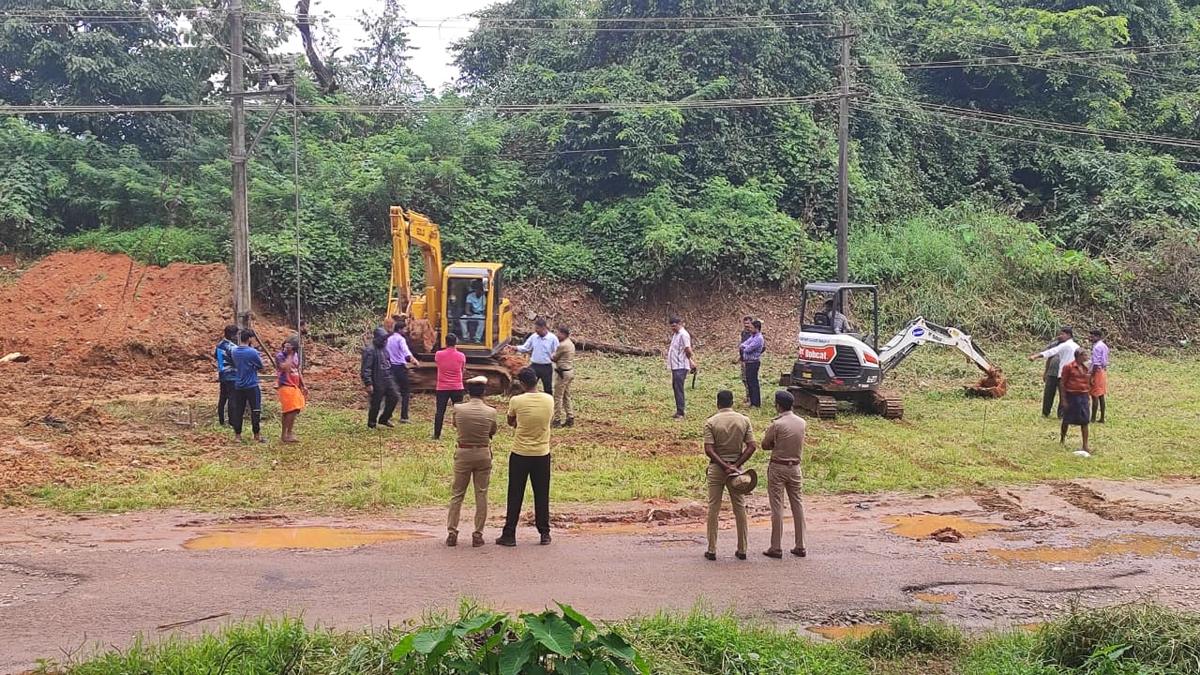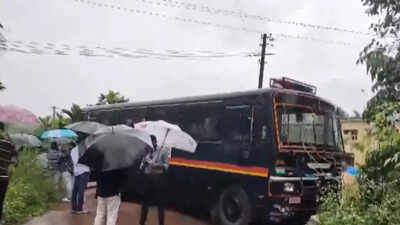In a startling move that has drawn widespread attention, the Special Investigation Team (SIT) conducted a search at the residence of activist Mahesh Shetty Thimarody in connection with the high-profile Dharmasthala case. The raid, carried out early morning, was reportedly aimed at gathering documents and electronic evidence related to allegations of misconduct and irregularities surrounding the temple administration. Activists and supporters of Thimarody expressed outrage, claiming the action was politically motivated. Authorities, however, maintained that the search was part of an ongoing probe into complaints lodged by multiple parties concerning financial and administrative discrepancies.
Eyewitness accounts indicated that SIT officials spent several hours at Thimarody’s residence, seizing documents, computers, and other electronic devices for detailed examination. Supporters of the activist assembled outside the property, demanding that the search be conducted transparently and without harassment. Thimarody, known for his outspoken stance against irregularities in temple management, stated that he was cooperating fully with the investigation. Meanwhile, the district administration emphasized that the SIT’s actions were legal and part of a structured effort to ensure accountability and transparency within the Dharmasthala temple administration.
The incident has triggered heated debates across social media and political circles. Critics of the SIT action argue that targeting a prominent activist may discourage public participation in oversight and accountability initiatives. Supporters counter that no one is above the law, including activists, and that investigations must be thorough. Legal experts note that while searches of private residences are sensitive, they are permissible under established procedural guidelines, provided due process is followed. This raid underscores the tensions between activism, governance, and law enforcement in Karnataka, raising questions about the balance between scrutiny and intimidation.

Background and Stakeholder Reactions
The Dharmasthala case revolves around allegations of mismanagement and irregularities in the administration of the renowned temple, which attracts thousands of devotees annually. Complaints include alleged misuse of funds, procedural lapses, and lack of transparency in temple affairs. Mahesh Shetty Thimarody has been a vocal critic of the management, often highlighting issues related to finances and administration. Supporters of the temple’s administration argue that Thimarody’s criticisms are exaggerated and politically motivated, while the activist maintains that his actions are in the interest of public accountability and ethical governance.
Legal analysts note that SIT involvement signals the seriousness of the investigation. By assigning a specialized team, authorities aim to ensure that all claims are investigated impartially and comprehensively. The SIT is empowered to gather evidence, interrogate witnesses, and examine financial records to determine if any wrongdoing occurred. Observers expect the investigation to involve both documentary and testimonial evidence, including interactions between temple management, activists, and other stakeholders. The process is likely to take several weeks, with multiple phases of evidence collection and verification before conclusions are reached.
The SIT raid on activist Mahesh Shetty Thimarody’s residence has sparked significant reactions from civil society groups across Karnataka. Many activist organizations condemned what they termed “intimidation tactics,” warning that such actions could create a chilling effect on public advocacy. Leaders of these groups argued that while legal scrutiny is essential, the timing and manner of the search appeared heavy-handed. They called for greater transparency in the investigative process, insisting that activists should be treated fairly and not targeted for raising legitimate concerns about public institutions. The episode has reignited debates on the balance between enforcement and civic freedoms.
Political analysts suggest that the raid could have wider implications for Karnataka’s political landscape. Opposition parties quickly voiced concern, accusing the ruling establishment of using investigative agencies to suppress dissent. They claimed that activists like Thimarody are essential for maintaining checks on powerful institutions, including religious and political entities. Meanwhile, ruling party representatives emphasized that the SIT action is strictly procedural and part of an impartial inquiry. This polarization highlights the intersection of governance, law enforcement, and political strategy, underscoring how high-profile investigations can quickly become arenas for broader ideological and partisan battles.
Supporters of Mahesh Shetty Thimarody gathered outside his residence during the SIT search, demanding that the probe be conducted professionally and without harassment. Many expressed fear that activists raising issues related to temple administration could face retaliation. Legal experts noted that such assemblies, when peaceful, are constitutionally protected expressions of civic concern. While authorities have assured that the search is standard procedure, public demonstrations indicate the emotional stakes involved. Observers say that the support Thimarody received underscores the respect and trust he has cultivated as a vocal advocate for transparency in religious and civic institutions.
The case highlights the evolving role of activists in holding institutional powers accountable. Thimarody has long been an outspoken critic of perceived mismanagement in Dharmasthala temple affairs, earning both praise and criticism. Advocates for governance reforms argue that activists serve as essential intermediaries between institutions and the public, ensuring transparency and accountability. Legal commentators suggest that while investigative agencies must perform their duties, they should also be sensitive to the potential chilling effect on civic participation. The raid, therefore, is being closely examined as a case study in the delicate balance between law enforcement and civil rights.

The historical importance of the Dharmasthala temple adds another layer of complexity. As one of Karnataka’s most prominent religious institutions, any allegations of mismanagement attract widespread attention. Devotees and stakeholders are concerned about the integrity of the temple’s operations, financial practices, and administration. Activists like Thimarody play a critical role in highlighting discrepancies, ensuring that cultural and religious institutions maintain accountability. The SIT’s involvement is viewed as a necessary step by some, while others caution that investigations must be thorough, unbiased, and avoid giving the impression of targeting individuals who challenge established authorities.
Implications for Activism and Governance
The raid has intensified discussions about the treatment of activists in Karnataka. While activists play a crucial role in maintaining transparency and public accountability, some argue that legal interventions may be perceived as punitive rather than investigatory. Scholars and civil society members stress that due process must be maintained to prevent the misuse of investigative powers. At the same time, authorities argue that investigations are necessary to uphold institutional integrity and protect public interests, ensuring that allegations of misconduct are properly scrutinized without bias.
The Dharmasthala case has attracted attention beyond Karnataka due to the temple’s prominence and historical significance. National media outlets have covered the SIT raid extensively, emphasizing the delicate balance between religious administration, legal accountability, and civil society activism. Stakeholders across the board, including devotees, political commentators, and legal experts, continue to monitor developments closely. The case is shaping up as a significant test of Karnataka’s legal institutions in handling high-profile investigations involving influential activists and prominent religious establishments.
Legal analysts have also focused on procedural aspects of the SIT’s search. Searches of private residences require strict adherence to the law, including proper warrants and documentation. Any misstep could render evidence inadmissible in court or be challenged as an infringement on personal rights. Experts emphasize that while collecting electronic records, financial documents, and correspondence is legitimate, authorities must maintain a clear chain of custody. Observers note that the thoroughness of the SIT investigation will be critical in ensuring that conclusions are legally sound and withstand judicial scrutiny.
The raid has triggered widespread media coverage, both in Karnataka and nationally. Newspapers, television channels, and online portals highlighted the tension between activism and legal accountability. Many editorials framed the event as a test of Karnataka’s institutions in handling high-profile cases involving influential activists. Social media platforms amplified diverse opinions, ranging from support for Thimarody to calls for strict enforcement of accountability standards. This extensive coverage ensures that the case remains in public discourse, potentially influencing perceptions of law enforcement, activism, and institutional integrity across the state.
Political observers have noted that the SIT raid could influence future activism in Karnataka. Some activists may become cautious, fearing legal entanglements or targeting, while others may be emboldened by the attention and public support received. The episode has ignited a broader debate on how the state manages investigations involving politically and socially prominent individuals. Analysts suggest that the outcome of this case could serve as a precedent, shaping strategies for both activists and authorities in future disputes related to governance and institutional oversight.
Community leaders and devotees have expressed mixed reactions to the ongoing investigation. While some emphasize the importance of transparency and support the SIT’s efforts, others worry that the process could tarnish the temple’s reputation and disrupt community harmony. Scholars note that religious institutions are uniquely sensitive in India, requiring careful handling of legal proceedings to avoid public unrest. The challenge for authorities is to conduct a comprehensive investigation while maintaining the trust and confidence of devotees, stakeholders, and the broader public.
Finally, the SIT’s investigation into Mahesh Shetty Thimarody’s involvement in the Dharmasthala case highlights broader tensions in governance, activism, and law enforcement. The outcome will have significant implications for accountability standards in religious and civic institutions. As the probe continues, legal experts, political analysts, and civil society actors will monitor developments closely. The case serves as a reminder that maintaining transparency, protecting activists, and upholding the law are interconnected challenges in Karnataka, reflecting the complexities of balancing justice, civil liberties, and institutional integrity in a democratic society.
Follow: Karnataka Government
Also read: Home | Channel 6 Network – Latest News, Breaking Updates: Politics, Business, Tech & More

